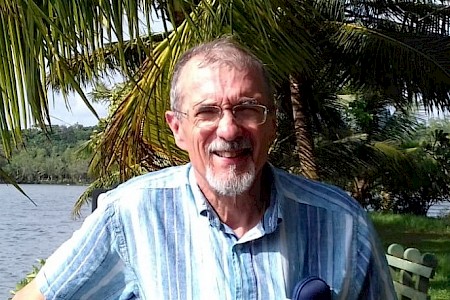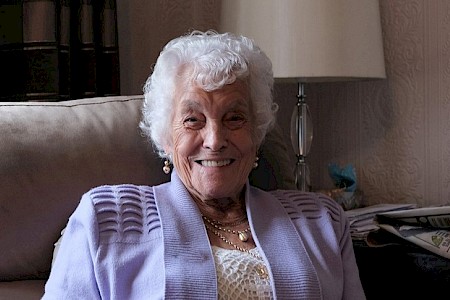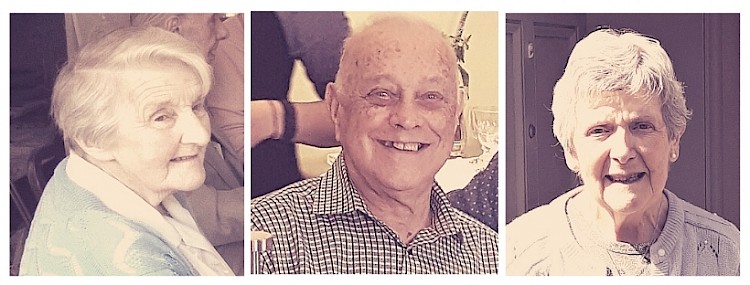These stories were collected by our volunteers Carl Gardner, Jean Chippindale, Emile Farhi and Sally Pitel.
Gwen (top row, centre) grew up in London and was 10 years old when the war ended.
"I was born in Bermondsey, near the docks, and lived there until about 1941, when we had to move to my grandmother’s flat in Penfold Street. We’d been bombed out three times.
Our first air raid shelter was specially built under the pavement in Church Street. But one night a bomb dropped close to a petrol station nearby and we had to get out in a hurry before it blew up.
The air raid shelter was damaged, but we returned the next day to try and find my sister’s doll, which she’d left behind. It was embedded in the wall and I realised that that could easily have been us.
I think that was when we were moved to Edgware Road tube station, where we had to go during the bombings. We slept on the platform - I can still remember the exact spot today. It was a bit like being in a village with a canteen, a children’s play area with entertainment, a first aid centre and loos and so on. But trains still ran through the night and started early in the morning.
Then came the doodlebugs (German V1 flying bombs). They were terrible. They came over during the day and their engines made a distinctive noise. When the noise stopped, they were able to drop and you had to take immediate cover.
This was when my mother said, ‘Enough is enough.’ Nine months before VE Day us girls were sent to stay with her friend in Northamptonshire.
My abiding memory of those last months of the war is wishing I was back in London. I had a terrible fear that my mother would be killed in the bombing and I would be left without her."
Elizabeth (top row, right) grew up in Melbourne, Australia. She was age five at the end of the war.
“My father suggested I cut out the headlines in the local newspaper for, firstly, VE Day (Victory in Europe) and then VJ Day (Victory in Japan). I remember those pages well. A little bit later I saw photos of ex-POWs of the Japanese disembarking from the ships. They were just skin and bone.
Six or seven years after this, I was at a Sunday picnic with my Sunday School teacher, who’d been an ex-POW in Japan. The boys started throwing bread rolls at each other and I remember he reprimanded them quietly, saying, ‘Don’t do that, I can’t bear to see food thrown around. My fellow prisoners and I would have given our right arms for that bread during the war.”
Joyce (middle row, left) was 17 when the war ended. She's always lived in London.
"I was 11 when the war started in September and was evacuated out of London with my sister. Nobody knew where we were going to be sent. We sat in a big hall for the selection process – we had to be checked for our gas masks and things and all the children were crying. Our mothers weren’t even allowed to see us off at the train station.
Me and my sister were sent to Northampton. I remember crying so much that my parents came to see us at the weekend with my one-year-old brother. We were brought back home after about two weeks. My sister and I were little rebels as we had no one to play with!
It was a very strange time in London. So quiet but there was a fantastic community feeling. There were no shelters at that time. I remember one afternoon with my mother in our garden in North Kensington, watching a terrifying Battle of Britain ‘dog fight’ in the sky, with planes coming down in flames and parachutes dropping down.
Later we moved into a flat in the newly built Dibden House in Maida Vale. A bomb hit the pub across the road, which was full of men playing a darts match. They were all killed. It was dreadful seeing the dead being laid out.
Then there was the time when the big heavy bombs were coming down, every night for about two months, always at about 6 o clock. Very frightening."
Frank (centre), who grew up in London, was 11 when the war started and 17 when it ended.
"When the war started in the summer of 1939, I was immediately evacuated to Beaconsfield. I was one of the last children to be housed there and the lady of the house had to be persuaded to take me. By Christmas we’d seen no bombs, so I came home again to London. I played in the streets for months but was eventually rounded up and evacuated to Banbury.
This wasn’t a happy time. The man of the house took me fishing with him but said I couldn’t talk to him because it would frighten the fish! His wife didn’t really want me there. One day when I gently pushed away their big English sheep dog at the dinner table, she said to me, ‘Don’t do that, he has more right to be here than you do!’
I was taken back to London and on my 14th birthday allowed to leave school and go to work. My first job was at Selfridge’s where I was given a company name, ‘Kane’ (everyone there had a company name back then). I worked on the instore Information Bureau and even met the founder, Gordon Selfridge, on several occasions.
One day, I heard this familiar American drawl say, ‘Can you tell me where the restaurant is?’ Quick as a flash, without looking up, I said, ‘Certainly Mr Gable’. I immediately recognised the voice the famous actor, Clark Gable who I’d seen in many films.
After the air raids, the kids where we lived used to collect pieces of shrapnel and swap the most interesting shaped bits. My eldest brother, Harry, worked for the Fire Service and part of his job was defusing bombs. One day he came back with a whole (defused) incendiary bomb for me and said, ‘Don’t let Mum see it. Hide it.’
I hid it under the bed, but my mother found it and thought it was live. She made me take it across the road to the ARP (Air Raid Precautions) office. Harry really got it in the neck when he came home."
Joy (middle row, right), who lived in the East End, was five when the war began and 11 when it ended.
"I remember on VE Day, even though I was only 11, I went down to the West End on my own, something that would be unheard of today. I felt completely safe and mixed with the crowds and saw the merry-making and the drinking on the street.
I was very independent by then, having been away from my mother most of the war. I even carried my Micky Mouse gas mask.
I was brought up in Mile End, in the east end of London. My mother was a single parent and to keep me and my brother, she worked as a machinist making uniforms for the forces. When I came home from school, I used to go up to the factory and sit in the machine shop watching her work.
The children in our area were evacuated quite early in the war in 1939. We were all given our own gas masks, which we proudly carried around our necks in a little box. We thought that was part of being in the war.
I was sent to what seemed like deep, deep country. In fact, it was Denham, just west of London. It felt like a different world. There were trees and grass and animals. Before this, I’d never seen a cow. They seemed like monsters at first! The houses seemed like palaces compared to the tenement block I grew up in.
We didn’t see much of the war - only the planes flying over, no bombing. But even as a kid you could tell the planes loaded with bombs. Their engines had a different tone.
My mother came up to see me every two weeks, but I can’t ever remember feeling lonely. I always had a very positive outlook.
I went back to London towards the end of the war. I did hear the last of the V1 and the V2 bombs and saw a lot of bomb sites around the East End."
Betty (bottom row, left) remembers the end of the war celebrations in London when she was 12.
"My memories of the war years were a time when people were extremely kind and caring towards each other. At home in Cheam with my parents, we all had to help with work on our allotment and gathering the vegetables. If you had any produce left over, you put it in a box by the front gate with a ‘Please help yourself’ notice.
By far the most frightening things were the V1 and V2 flying rocket bombs in 1944. They were programmed to fly out of range to avoid setting off our siren alarms. When they reached their destination, the engine just cut out and came crashing down. It was completely terrifying not knowing where they were going to land.
After hearing the evening radio announcement on the 7 May that victory in Europe had been agreed and a national holiday the following day declared, my father said we must go up to Buckingham Palace.
London was absolutely packed with thousands of rejoicing people, hugging one another, singing and dancing all through the streets and drinking celebratory beer. It was so joyous and exciting. Everyone linked arms and we walked down the Mall.
Every so often, a cry went up of ‘We want the King! We want the Queen!’ and they would come out on the balcony with the two princesses, Elizabeth and Margaret. On at least one occasion, they were joined by Winston Churchill. They waved to the crowds and everyone let out a huge roar and we waved our flags (being sold at exorbitant prices!).
Many Services personnel, including American and Canadian troops, were mingling with the crowds and people were climbing on the Queen Victoria Memorial and up the lamp posts. We heard the next day that even the two princesses had gone incognito into the crowds that evening to take part in the celebrations.
It was a truly memorable day which I’ll always remember."
Joan (bottom row, centre) shares her memories of life as an ATS convoy lorry driver at 19 years old.
"I joined the Auxiliary Territorial Service (ATS), the women’s branch of the British Army and, by the age of 19, I was training as a convoy lorry driver.
After training and passing my driving test, I was transferred to the army transport hub in Scotland. Much of my work involved driving transport lorries in slow convoy from Scotland to the London area docks and ports for shipment to Europe for the troops.
No motorways existed and the largely country roads were unlit, while the towns were poorly lit. After delivering the lorries, we drivers then returned to Scotland by train (steam, of course). Another slow journey with limited lighting in the trains and none at all at the stations.
On one occasion, I had to drive a heavy transport vehicle alone from the base to a destination in west Scotland and I was very worried that I might break down somewhere with no means of contacting someone for help. I remained in the ATS until 1947.
I remember the V1 and V2 flying bombs, or buzz bombs, which caused such terror in 1944. I was travelling on a train from Northolt one day with friend when we saw what appeared to be an aeroplane on fire in the sky. In fact, it was our first sight of a V1 rocket bomb which was propelled by jet fire from the rear.
On another occasion, I was cycling along Western Avenue (the A40) near Acton when I heard the noise of a flying bomb cut out very suddenly and knew it was about to land somewhere nearby. This happened a few times and it was very frightening.
Those war years were a difficult and very peculiar time for all of us."
-
View
-
View
More news

'I love to feel I'm contributing'
Spurred on by the lockdown, longtime Re-engage volunteer, Bob Jones, sought out a new way to help older people.
By Re-engage

'You get to have a real chat'
Trudy, 88, who tragically lost her brother to Coronavirus in June, talks about the loneliness of lockdown and the joy of a phone call from someone who cares.
By Re-engage


